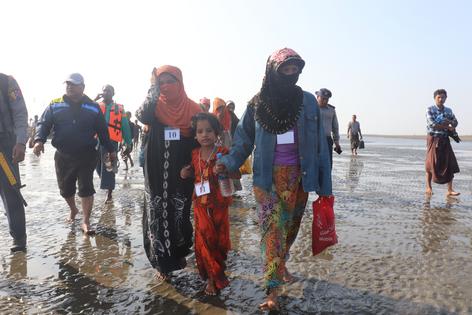The politics of blasphemy: Why Pakistan and some other Muslim countries are passing new blasphemy laws
Published in News & Features
On Jan. 17, 2023, Pakistan’s National Assembly unanimously voted to expand the country’s laws on blasphemy, which carries the death penalty for insulting the Prophet Muhammad. The new law now extends the punishment to those deemed to have insulted the prophet’s companions, which could include thousands of early Muslims, with 10 years in prison or life imprisonment.
Human rights activists are concerned that the expanded laws could target minorities, particularly Shiite Muslims who are critical of many leading early Muslims.
Pakistan has the world’s second-strictest blasphemy laws after Iran. About 1,500 Pakistanis have been charged with blasphemy over the past three decades. In a case covered by the international media, Junaid Hafeez, a university lecturer, was sentenced to death on the charge of insulting the prophet on Facebook in 2019. His sentence has been under appeal.
Although no executions have ever taken place, extrajudicial killings related to blasphemy have occurred in Pakistan. Since 1990, more than 70 people have been murdered by mobs and vigilantes over allegations of insulting Islam.
My research shows that blasphemy laws historically emerged to serve the political and religious authorities, and they continue to have a role in silencing dissent in many Muslim countries.
Of the 71 countries that criminalize blasphemy, 32 are majority Muslim. Punishment and enforcement of these laws vary.
Blasphemy is punishable by death in Iran, Pakistan, Afghanistan, Brunei, Mauritania and Saudi Arabia. Among non-Muslim-majority countries, the harshest blasphemy laws are in Italy, where the maximum penalty is two years in prison.
Half of the world’s 49 Muslim-majority countries have additional laws banning apostasy, meaning people may be punished for leaving Islam. All countries with apostasy laws are Muslim-majority. Apostasy is often charged along with blasphemy.
Laws on apostasy are quite popular in some Muslim countries. According to a 2013 Pew survey, about 75% of respondents in Muslim-majority countries in Southeast Asia, the Middle East, North Africa and South Asia favor making sharia, or Islamic law, the official law of the land. Among those who support sharia, around 25% in Southeast Asia, 50% in the Middle East and North Africa and 75% in South Asia say they support “executing those who leave Islam” – that is, they support laws punishing apostasy with death.
My 2019 book “Islam, Authoritarianism, and Underdevelopment” traces the roots of blasphemy and apostasy laws in the Muslim world back to a historic alliance between Islamic scholars and government.
Starting around the year 1050, certain Sunni scholars of law and theology, called the “ulema,” began working closely with political rulers to challenge what they considered to be the sacrilegious influence of Muslim philosophers on society.
Muslim philosophers had for three centuries been making major contributions to mathematics, physics and medicine. They developed the Arabic number system used across the West today and invented a forerunner of the modern camera.
The conservative ulema felt that these philosophers were inappropriately influenced by Greek philosophy and Shiite Islam against Sunni beliefs. The most prominent name in consolidating Sunni orthodoxy was the respected Islamic scholar Ghazali, who died in the year 1111.
In several influential books still widely read today, Ghazali declared two long-dead leading Muslim philosophers, Farabi and Ibn Sina, as apostates for their unorthodox views on God’s power and the nature of resurrection. Their followers, Ghazali wrote, could be punished with death.
As modern-day historians Omid Safi and Frank Griffel assert, Ghazali’s declaration provided justification to Muslim sultans from the 12th century onward who wished to persecute – even execute – thinkers seen as threats to conservative religious rule.
This “ulema-state alliance,” as I call it, began in the mid-11th century in Central Asia, Iran and Iraq and a century later spread to Syria, Egypt and North Africa. In these regimes, questioning religious orthodoxy and political authority wasn’t merely dissent – it was apostasy.
Parts of Western Europe were ruled by a similar alliance between the Catholic Church and monarchs. These governments assaulted free thinking, too. During the Spanish Inquisition, between the 16th and 18th centuries, thousands of people were tortured and killed for apostasy.
Blasphemy laws were also in place, if infrequently used, in various European countries until recently. Denmark, Ireland and Malta all recently repealed their blasphemy laws. But they persist in many parts of the Muslim world.
In Pakistan, the military dictator Zia-ul-Haq, who ruled the country from 1978 to 1988, is responsible for its harsh blasphemy laws. An ally of the ulema, Zia updated blasphemy laws – written by British colonizers to avoid interreligious conflict – to defend specifically Sunni Islam and increased the maximum punishment to death.
From the 1920s until Zia, these laws had been applied only about a dozen times. Since then, they have become a powerful tool for crushing dissent.
Some dozen Muslim countries, including Iran and Egypt, have undergone a similar process over the past four decades.
The conservative ulema base their case for blasphemy and apostasy laws on a few reported sayings of the prophet, known as hadith, primarily: “Whoever changes his religion, kill him.”
But many Islamic scholars and Muslim intellectuals reject this view as radical. They argue that Prophet Muhammad never executed anyone for apostasy, nor encouraged his followers to do so. Criminalizing sacrilege isn’t based on Islam’s main sacred text, the Quran, either. It contains over 100 verses encouraging peace, freedom of conscience and religious tolerance.
In Chapter 2, Verse 256, the Quran states, “There is no coercion in religion.” Chapter 4, Verse 140 urges Muslims to simply leave blasphemous conversations: “When you hear the verses of God being rejected and mocked, do not sit with them.”
By using their political connections and historical authority to interpret Islam, however, the conservative ulema have marginalized more moderate voices.
Debates about blasphemy and apostasy laws among Muslims are influenced by international affairs.
Across the globe, Muslim minorities – including the Palestinians under Israeli occupation, Chechens of Russia, Muslim Kashmiris of India, Rohingya of Myanmar and Uyghurs of China – have experienced persecution.
Alongside persecution are some Western policies that discriminate against certain Muslims, such as laws prohibiting headscarves in schools.
Such laws and policies can create the impression that Muslims are under siege and provide an excuse for the belief that punishing sacrilege is a defense of the faith.
Instead, blasphemy laws have served political agendas of populist politicians and their religious supporters in Pakistan and some other Muslim countries.
Moreover, these laws contribute to anti-Muslim stereotypes about religious intolerance. Some of my Turkish relatives even discourage my work on this topic, fearing it fuels Islamophobia.
But my research shows that criminalizing blasphemy and apostasy is more political than it is religious. The Quran does not require punishing sacrilege: Authoritarian politics do.
This is an updated version of a piece first published on February 20, 2020.
This article is republished from The Conversation, an independent nonprofit news site dedicated to sharing ideas from academic experts. If you found it interesting, you could subscribe to our weekly newsletter.
Read more:
At 75, Pakistan has moved far from the secular and democratic vision of its founder, Mohammad Ali Jinnah
Execution for a Facebook post? Why blasphemy is a capital offense in some Muslim countries
Ahmet T. Kuru does not work for, consult, own shares in or receive funding from any company or organization that would benefit from this article, and has disclosed no relevant affiliations beyond their academic appointment.













Comments